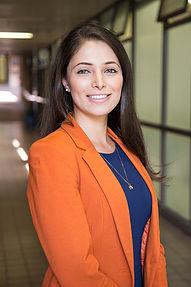Angela Ocampo Examines the Importance of Belonging
 Post developed by Katherine Pearson and Angela Ocampo
Post developed by Katherine Pearson and Angela Ocampo
Feelings of belonging are powerfully important. A sense of inclusion in a group or society can motivate new attitudes and actions. The idea of belonging, or attaining inclusion, is the centerpiece of Angela Ocampo’s research. Her dissertation exploring the effect of inclusion on political participation among Latinos will receive the American Political Science Association’s (APSA) Race and Ethnic Politics Section’s award for the best dissertation in the field at the Fall 2019 APSA meetings.
Dissertation and Book Project
Dr. Ocampo’s dissertation grounds the theory of belonging and political participation within the literature. This research, which she is expanding into a book, finds that feelings of belonging in American society strongly predict higher levels of political engagement among Latinos. This concept represents the intersection of political science and political psychology. Dr. Ocampo draws from psychology research that belonging is a human need; people need to feel that they are a part of a group in order to succeed and have positive individual outcomes, as well as group outcomes. She builds on these psychological concepts to develop this theory of social belonging in the national community, and how this influences the perception of relationship to the polity.
The book will explore the social inclusion of racial and ethnic minorities, and how that shapes the way they participate in politics. Dr. Ocampo argues that the idea of perceiving that you belong, and the extent to which others accept you, has an influence on your political engagement and opinion of policies. For the most part, Dr. Ocampo looks at Latinos in the US, but the framework is applicable to other racial and ethnic groups. She is also collecting data among Asian Americans, African Americans, and American Muslims to look at perceived belonging.
Methodological Expertise
Before she began this research, there were no measures to capture data on belonging in existing surveys. Dr. Ocampo validated new measures and tested and replicated them in the 2016 collaborative multiracial postelection survey.
While observational data is useful for finding correlations, it can’t identify causality. For this reason, experiments also inform Dr. Ocampo’s research. In one experiment, she randomly assigned people to a number of different conditions. Subjects assigned to the negative condition showed a significant decrease in their perceptions of belonging. However, among those assigned to the positive condition, there were no corresponding positive results. In both the observational data and experiments, Dr. Ocampo notes that experiences of discrimination are highly influential and highly determinant of feelings of belonging. That is, the more experiences of discrimination you’ve had in the past, the less likely you are to feel that you belong.
Doing qualitative research has taught Dr. Ocampo the importance of speaking with her research subjects. “It’s not until you get out and talk to people running for office and making things happen that you understand how politics works for everyday people. That’s why the qualitative data and survey work are really important,” she says. By leveraging both qualitative and quantitative methodologies, Dr. Ocampo is able to arrive at more robust conclusions.
A Sense of Belonging in the Academic Community
Starting in the Fall of 2020, Dr. Ocampo will be an Assistant Professor of Political Science at the University of Michigan and a Faculty Associate of the Center for Political Studies. She says that the fact that her work is deeply personal to her is what keeps her engaged. As an immigrant herself, Dr. Ocampo says, “I’m doing this for my family. I’m in this for other young women and women of color, other first-generation scholars. When they see me give a class or a lecture, they know they can do it, too.”
Dr. Ocampo is known as a supportive member of her academic community. She says it’s an important part of her work: “The reason it’s important is that I wouldn’t be here if it wouldn’t have been for others who opened doors, were supportive, were willing to believe in me. They were willing to amplify my voice in spaces where I couldn’t be, or where I wasn’t, or where I didn’t even know they were there.” She notes that in order to improve the profession and make it a more diverse and welcoming place where scholars thrive, academics have to take it upon themselves to be inclusive.

